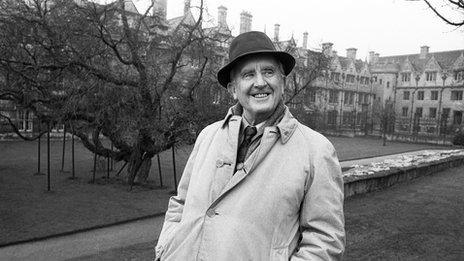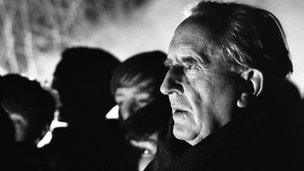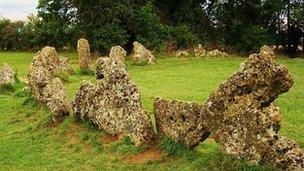Oxfordshire inspired Tolkien's The Hobbit and Lord Of The Rings
- Published

J.R.R. Tolkien moved to Oxford in 1911
Celebrations are taking place around the world to mark the 121st birthday of novelist and academic Professor J.R.R. Tolkien, who was born on 3 January 1892.
Tolkien wrote The Hobbit and The Lord Of The Rings while living in Oxford.
"[I remember] the actual flashpoint," Tolkien told the BBC in March 1968 about his idea for The Hobbit. "I can still see the corner in my house in 20 Northmoor Road where it happened.
"I'd got an enormous pile of exam papers there and was marking school examinations in the summer time, which was very laborious, and unfortunately also boring.
"I remember picking up a paper and nearly gave it an extra mark, or extra five marks actually, because one page on this particular paper was left blank. Glorious! Nothing to read.
"So I scribbled on it, I can't think why, 'In a hole in the ground there lived a hobbit'."
The Inklings
The idea came during the more than 50 years of his adult life that Tolkien spent in Oxford.
"He moved to Oxford in 1911 to study classics at Exeter College, he was rejected the year before but got in the year afterwards," says The Tolkien Society's Shaun Gunner.

Tolkien is buried at Wolvercote Cemetery in Oxford
"But he didn't actually enjoy classics so he later changed to study English Language and Literature".
During that period, Tolkien worked for two years on the Oxford English Dictionary after serving in World War I.
"Then he took a brief two years out in Leeds and came back and became the Rawlinson and Bosworth Professor of Anglo-Saxon at Oxford University, and did that for many years until 1945," said Mr Gunner.
Afterwards, Tolkien became the Merton College Professor of English Language and Literature, a role he stayed in until 1959.
He formed a meeting group in Oxford called The Inklings with fellow academic author C.S. Lewis and other friends.
The Eagle And Child pub was their most famous meeting place, where a plaque inside the pub commemorates their get-togethers.
Tolkien's final resting place was at Wolvercote Cemetery in north Oxford.
'Antiquity and atmosphere'
But what was it about the city that Tolkien loved so much?
"It was the antiquity and its atmosphere of learning, its second hand book shops and the fact that it provided him with the company of learned companions who encouraged him in what he wrote," John Garth, author of Tolkien And The Great War said.
Oxfordshire also provided Tolkien with rich textures for the landscapes in his books, which were necessary for the format he had chosen.
Speaking to the BBC about The Lord Of The Rings, Tolkien said: "One of the best forms for a long narrative, as was found in The Hobbit, is a much more elaborate form of the pilgrimage or the journey with an object, so that was inevitably the form I adopted."

The Rollright Stones may have inspired the Barrow-downs scenery in Tolkien's books
Mr Garth said: "Oxford is a river valley lined with willows. In The Lord of the Rings, although it doesn't feature in the films, there is a character called Old Man Willow, who was a predatory demon in the shape of a tree and tries to trap the hobbits and casts a spell of sleepiness on them".
Mr Garth adds that the landscape beyond city also may have proved inspirational.
For example, the rolling Berkshire Downs, the Vale of White Horse with its prehistoric horse hill figure, and notably the Rollright Stones, near Chipping Norton in Oxfordshire.
"These stones may have provided an inspiration for the Barrow-downs, where the hobbits in The Lord Of The Rings are ensnared by a malevolent wraith that haunts a barrow or burial mound," said Mr Garth.
On 3 January, Tolkien fans in the UK, Brazil, USA, Canada, Spain, Australia, Japan, Italy, and the Netherlands will be celebrating the author's birthday with a host of parties and events
In the UK events are taking place in cities including Brighton, London, Oxford, Bristol, Milton Keynes, and York with a toast to Tolkien at 21:00 GMT.
- Published21 November 2012
- Published16 October 2012
- Published18 April 2012
- Published22 June 2010